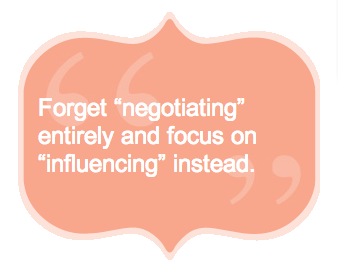By Linda Descano, CFA®, President and CEO, Women & Co
Day after day, 24/7, we are engaged in some form of negotiation. We negotiate crowds on subways. We negotiate multiple lanes of traffic to get to our exit. We negotiate with our kids to get them out of bed and at the bus stop on time. We negotiate with our partner over who will be “chef du jour” for dinner. We negotiate with team members over project timetables and milestones. We negotiate over must-have vintage “finds” at weekend flea markets. In fact, these encounters—what I refer to as “little n” negotiations—are so natural for most of us that we don’t “sweat” over them.
 Yet, when it comes to negotiation over a possible promotion, a potential job change, or a strategic alliance, many of us stress, over-analyze and even freeze up. As negotiation guru, Linda Swindling says, “The word negotiation in these types of ‘high-stakes’ situations conjures up high-pressured sales or creates a feeling that you have to be ready to go to battle or that someone might take advantage of you.”
Yet, when it comes to negotiation over a possible promotion, a potential job change, or a strategic alliance, many of us stress, over-analyze and even freeze up. As negotiation guru, Linda Swindling says, “The word negotiation in these types of ‘high-stakes’ situations conjures up high-pressured sales or creates a feeling that you have to be ready to go to battle or that someone might take advantage of you.”
Her solution? Forget “negotiating” entirely and focus on “influencing” instead. She adds, “The bottom line is this: what you are attempting to do is identify another’s interests and provide information to help him or her determine whether entering into an agreement with you makes sense. This mental shift may sound subtle, but can drive a substantial difference in outcome.”
Beyond a shift in perspective, Linda advises her clients to mind these seven do’s and don’ts of effective influencing:
1. Make it easy to say “yes” to you.
If you are negotiating with a person who will need approval, help him or her be a good advocate for you. Assist the other side in “selling” the deal to others by asking what information would make communicating easier. Also, realize what limits the other side faces. No matter how persuasive or likeable you are, no one is going to be willing to lose a job or be professionally embarrassed to support your position.
2. Give yourself a break.
One of the biggest fears is that you are going to leave something on the table or that there could have been a better deal. If you had more time or information youmight have obtained more or reached a better outcome. However, you might also have risked the deal falling apart. With additional time, the other party might have gone elsewhere or might have found better information to use against you.
3. Become a decision-maker.
The quickest way to become a better negotiator is to begin to make decisions like a CEO or key executive. Be less concerned with the appearance of looking smart. Instead, allow yourself the time to ask the right questions and get them answered BEFORE investing your finances or time. And if you are dealing with decision makers, remember they like to make decisions. When possible offer them two or three options and have them make the selection.
4. Adjust course.
Have a Plan “B” and even a “C” and “D” and don’t become so focused and committed to one path that you can’t take another if you get detoured. Don’t settle for less than you want in a negotiation because adjusting course seems too time-consuming or difficult. When the unexpected occurs, stay creative, make the best decision you can, and keep moving forward.
5. Don’t assume that one-size fits all.
Negotiations and deals often involve similar facts, figures, and companies. However, negotiations involve people who communicate differently, want personal outcomes, and have unique interests. For instance, someone who is bottom-line oriented does not want the details another person may need to reach an agreement. Use what you know about personality types and communication styles and be ready for any person.
6. Don’t be bullied.
Don’t be afraid to walk away from a deal if needed. If people are jerks before you begin doing business with them, imagine how working with them will be. High-pressured tactics aren’t effective for long-term relationships. Realistically, no one can force someone to take a deal and expect another party to willingly adhere to the agreement. Instead of creating a durable relationship, the party that feels intimidated looks for opportunities to sabotage the deal.
7. Don’t be too impressed, no matter what someone’s role or title is.
Important people don’t have time to waste. Stop worrying how you appear or if they like you. If they are spending their most precious commodity, their time, with you then you have something they want. Your job is to ask them questions and discover the good business reasons they want to negotiate with you.
A version of this post appeared originally on Citi’s Women & Co.




